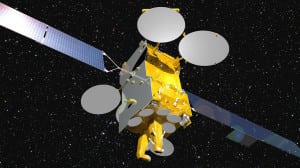Latest News
[Via Satellite 09-15-2015] Eutelsat Communications has signed up a number of customers in Africa and in Europe for broadcast services, and also tightened it’s collaboration with Internet of Things (IoT) pioneer Sigfox. New broadcast customers are planning to launch collectively more than 175 channels, with the transition from analogue to digital opening up new doors for satellite.
United Business Machines EG (UBM), an IT specialist company in Equatorial Guinea purchased capacity for a new pay-TV platform called EG SAT, which will broadcast more than 60 channels. Telekom Austria Group doubled the number of transponders leased on Eutelsat 16A from four to eight to support Antik Telekom’s upcoming platform with more than 90 channels, of which one third will be in High Definition (HD). Canal+ is also launching a new pay-TV service by the end of the year with 25 channels, contracting a 72MHz transponder on Eutelsat 3B, and Arqiva in the U.K. inked an agreement for a 14th transponder for the country’s Direct-to-Home (DTH) market.
Broadcaster Frenzy
Each broadcast customer has plans to expand channels and video content. For most, leveraging satellite is boosting the transition to digital in the face of analogue switch offs.
Using Eutelsat 16A, UBM will focus extensively on providing Spanish content, and will also include French, English and Portuguese content to support the ongoing effort to integrate the country’s Spanish-speaking populace into the predominantly French- and Portuguese-speaking regions of West Africa. The company will also broadcast Equatorial Guinea’s three national channels on a Free-to-Air (FTA) basis and deliver them to terrestrial re-transmitters and headends.
Arqiva, with its new transponder, plans to expand its digital multiplex offering and broaden the options available to its existing and future customer base.
Antik Sat a joint DTH platform between Telekom Austria Group and Antik Telekom, launches next month targeting the Slovak and Czech markets. Antik Sat folds satellite broadcasting into Antik Telecom’s services, which include Internet, IPTV, and Voice Over IP (VoIP) services via fiber and wireless infrastructure. The platform will include local channels, international channels, an online archive and second-screen online solutions for smart devices.
Telekom Austria Group Director of Wholesale Stefan Amon said in a Sept. 11 statement that the satellite broadcasting venture began with Eutelsat two years ago with the goal of accelerating the transition from analogue to digital in Central and Eastern Europe. The new service will be marketed online and through more than 150 independent distributors across both Czechoslovakia and Slovakia. Antik plans in a second stage to offer hybrid boxes combining satellite reception and IP services, and will also seek to forge partnerships with other service providers in both markets.
Canal+ Overseas, the Canal+ subsidiary in charge of broadcasting internationally and in French overseas territories, is also using satellite to shift to digital in Africa. The company’s new C-band transponder capacity will deliver channels to Digital Terrestrial Television (DTT) transmitters in approximately 10 French-speaking countries in an area stretching from Guinea to the Democratic Republic of the Congo.
Eutelsat Chairman and CEO Michel de Rosen described Africa’s transition from analogue to digital as a catalyst for satellite during the company’s earnings call in July this year. Comparing the market to Europe, he highlighted significant potential.
“This market is significantly underpenetrated. Four numbers illustrate this point: There are only two channels per million inhabitants in Africa, whereas there are 11 channels per million inhabitants in Western Europe; HD penetration is low in Africa at just 5 percent compared to around 18 percent in Europe. DDT transition, which is usually the booster for channel line up is largely ahead of us in Africa, with a number of countries expected to complete digital switchover in the next years,” he said.
The Internet of Things in The United States
Eutelsat participated in a financing round for Sigfox, a fast growing Machine-to-Machine (M2M) and Internet of Things (IoT) company, earlier this year. Along with international telecom operators, a financial sponsor and other industrial partners, Sigfox raised $115 million for its low power connectivity network. On Sept. 14 the company announced it would integrate Eutelsat’s ‘SmartLNB’ into its infrastructure as one of the solutions to enable base stations to exchange data.
Sigfox provides subscription-based communications services for connecting IoT devices wirelessly, focusing on small message exchanges to limit power consumption. This in turn allow years-to-decades of device battery life and lower communications costs. The company intends to use the SmartLNB with Eutelsat 113 West A for coverage in North America, with the U.S. as it’s first market.
“Our customers run business-critical applications on our network and we therefore use high availability solutions throughout our infrastructure to ensure that our network continues to function in all events,” said Rodolphe Baronnet-Frugès, executive vice president of networks and operators at Sigfox. “We have selected Eutelsat’s SmartLNB solution for base station backhaul connectivity because of its very high reliability and ubiquitous coverage. This solution also simplifies the selection of base station sites while lowering operating costs.”
Looking to Ultra-HD
Eutelsat has also released new forecasts on Ultra-HD television sales from GfK, predicting a striking 200 percent spike in Ultra-HD screen sales from June to December 2015. The research group expects that by 2020, more than 70 percent of total sales across Europe and almost 60 percent in the Middle East and North Africa will be Ultra-HD. The annual volume of screens sold in these markets is expected by then to have reached 37 million. Eutelsat has embarked on other projects in the video market as well, joining the Sat>IP Alliance and forging the Future Video Initiative with SES while at IBC 2015 in Amsterdam, Netherlands.
Get the latest Via Satellite news!
Subscribe Now
